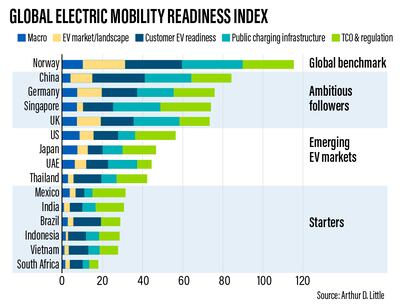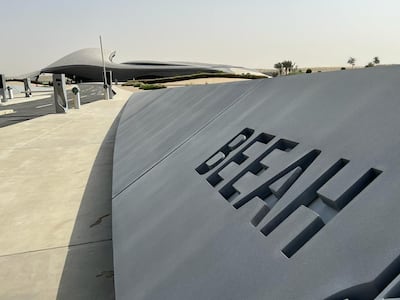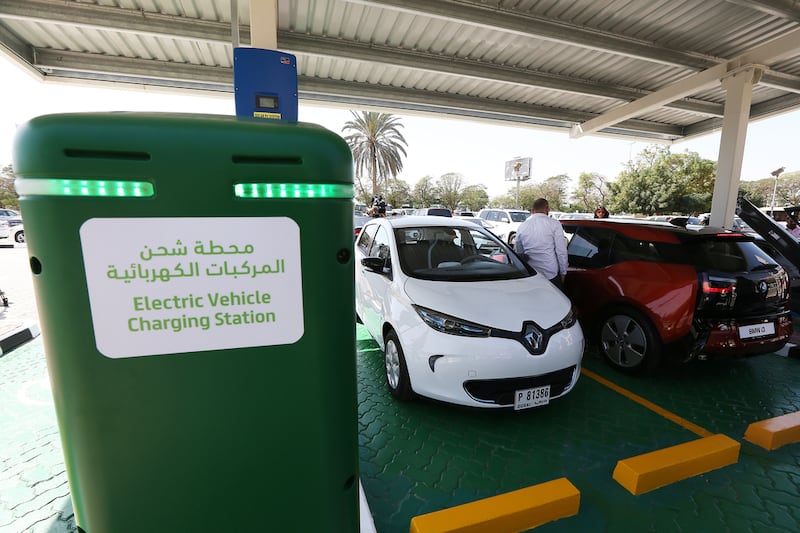The UAE has committed to pursuing ambitious policies geared towards ensuring the country is carbon-neutral in fewer than three decades.
Alongside a raft of measures under the Net Zero 2050 Charter and UAE Vision 2021 initiatives, a key element to this Dh600 billion strategy involves encouraging the adoption of electric vehicles, or EVs.
Reports suggest the public is on board with the idea of getting out of fossil-fuel-reliant transport and into other options, and figures suggest the EV market in the UAE will gather significant momentum in the next four years.
There will be a near threefold rise in the number of electric vehicles sold annually in the country in that time period, Statista, a market and consumer data analysis company, suggests.
Similar results are predicted by other consultancies.
Such a rise will require significant upgrades in infrastructure, not least ensuring drivers have sufficient access to charging points, whatever form these might take.
Powertech Mobility is one of the UAE's key providers of EV infrastructure.
Company director Arthi Srinivasan is confident about the future of electric transport in the region, noting a tangible push in this direction from both businesses and government organisations.
She sees the need for further changes, though, notably the expansion of fast-charging hubs across highways and more individual charging units.
"These solutions need to be strategically placed in high-traffic areas to ensure that EVs have access to charging facilities whenever they need them," she tells The National.
Power management may also be an issue.
"The country has been making significant strides in developing renewable energy sources such as solar power, and utilising these sources for charging EVs could be a game-changer for the future of electric mobility in the UAE," she adds.
There is further evidence that the UAE is making strides in the right direction — a report by consultancy Arthur D Little suggests the country is ranked eighth globally in readiness for electric mobility.

The UAE is classified as an “emerging EV market” that ranks “high in readiness”, sitting only a few points behind traditionally innovative motoring manufacturers such as Japan and Germany.
Admittedly, China, Europe and the US still account for about 95 per cent of the total number of cars currently being sold, but the UAE's current placing appears to set it up well for what lays ahead.
EVs will make up about half of the new car sales worldwide by 2035, according to Goldman Sachs Research.
The US-based investment bank suggests the number being sold will rise to 73 million units in 2040, up from some 2 million in 2020 with percentages projected to rise to more than 60 per cent (up from two per cent) during that period.

So far, the UAE has converted around a fifth of its government agency cars to EVs and is aiming for 42,000 on the roads by 2030.
Speaking at Abu Dhabi Finance Week in November, Mohamed Al Shorafa, the chairman of the Abu Dhabi Department of Economic Development called the green economy the 21st-century’s “logical solution”, urging other economies to “jump on our bandwagon”.
The Dubai Electricity and Water Authority says it is aiming for 1,000 public charging stations in the emirate alone by 2025, an increase from 620 at the end of 2022.
However, one issue that continues to surround EVs is the manufacturing and recycling of batteries.
The number of factories producing lithium-ion units, which are used to power EVs, is expected to increase almost eightfold between 2021 and 2031, according to the Centre for Research on Multinational Corporations.
The agency sees electric options as part of the future of mobility, but draws attention to the scale of mineral consumption necessary for the creation of batteries.
“Electric vehicles are part of the solution to climate change," says Alejandro Gonzalez, a researcher at the centre.
"But the size and sheer volume of planned EV production is not sustainable.
“We cannot consume our way to a cleaner, greener future. We need fewer cars, smaller cars, and more sustainable public transport options."

For its part, the UAE has made in-roads into addressing these issues — at the start of the year, Beeah Group, a Sharjah environmental management company, announced plans for its first recycling plant for spent EV batteries.
As far as alternative power sources are concerned, the UAE is set to launch its National Hydrogen Strategy imminently.
Public transport options also continue apace, not least in the shape of Etihad Rail, which is looking to change the landscape of the country by transporting 36 million people annually by 2030.







